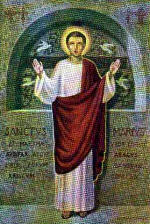 John Bosco was born on August 16th 1815 at Becchi in Piedmont. Even in early youth he had a great influence on children; and while still a young shepherd, his future mission was revealed to him in a vision of thousands of lambs and sheep gathered round him.
John Bosco was born on August 16th 1815 at Becchi in Piedmont. Even in early youth he had a great influence on children; and while still a young shepherd, his future mission was revealed to him in a vision of thousands of lambs and sheep gathered round him.He was brought up by a saintly mother, Margaret Bosco, and later under the care of the parish priest of Castelnuovo near Asti. He afterwards entered the seminary of Chieri. After his ordination he settled down in Turin, where he was "all to all" (Breviary) and "through his confidence in God" (Breviary) achieved great works in spite of the most fierce opposition.
His wish to help young boys and girls, especially of the poorer classes, led him to found in 1852 the Congregation of the Salesian Fathers and in 1872 that of the Daughters of our Lady Help of Christians (Collect). Full of zeal for souls and for the propagation of the Faith (Martyrology), he established the Union of the Salesian Co-operators in 1875, and founded houses in the foreign missions. Comparing him to Abraham the Church sings: "Against hope he believed in hope, that he may be made father of many nations, according to that which was said to him" (Communion).
Dom Bosco guided young people as their "father and master" (Collect) with such wisdom and prudence that the church compares him to Solomon: "His heart was as large as the sand that is on the sea shore" (Introit), "a golden heart like that of a mother, for the poorest among the poor" (Pius XI).
Like Saint Francis of Sales, whose name he gave to his Order, he did everything in a spirit of divine charity, forgetting himself and working for the glory of God and the salvation of souls (Introit, Collect, Alleluia, Offertory, Secret). In the same way as this great doctor, St John Bosco was inspired by the doctrine of St Paul (Epistle) and by the example of Christ who was meek and humble of heart; he practised and preached holy joy, kindness, thanksgiving (Epistle, Postcommunion) goodness, meekness and humility (Gospel).
In difficult circumstances he defended the interests of the Church and often "helped the Roman Pontiff" (Breviary) by his influence on sectarian statesmen. Thanks to him the effects of anti-religious laws in Italy were often mitigated.
This holy man died in 1888 when 73 years of age. He was canonized by Pius XI on Easter Sunday 1934, and his feast extended to the universal Church in 1936.
His religious family is carrying on his work so that on Dec. 3rd 1933 Pius XI could describe it as numbering: 19000 religious, 1430 houses of education, 80 religious provinces, thousands of churches, chapels boarding schools and boys' clubs, 17 territories in the mission field, hundreds of thousands of pupils and about a million old pupils, about as many co- operators, who after his own expression "lengthen his arm". In heaven, St John Bosco prays for them and for those who have recourse to his intercession (Postcommunion).
Dedit illi Deus sapientiam et prudentiam multam nimis, et latitudinem cordis quasi arenam quae est in littore maris. * Laudate, pueri, Dominum, laudate nomen Domini.
God gave him wisdom and understanding exceeding much, and largeness of heart as the sand that is on the sea shore. * Praise the Lord, ye children: praise ye the name of the Lord,
(3 Kings 4:29 and Psalm 112:1 from the Introit of Mass)
Deus, qui sanctum Joannem Confessorem tuum adolescentium patrem et magistrum excitasti, ac per eum, auxiliatrice Virgine Maria, novas in Ecclesia tua familias florescere voluisti: concede, quaesumus, ut eodem caritatis igne succensi, animas quaerere, tibique soli servire valeamus.
O God, who didst raise up saint John, Thy confessor, to be a father and teacher of youth, and didst will that through him, with the help of the Virgin Mary, new families should flourish in Thy Church, grant, we beseech Thee, that enkindled with the same fire of charity, we may be able to seek after souls and to serve Thee alone.
From the Catholic Encyclopaedia: http://www.newadvent.org/cathen/02689d.htm





























